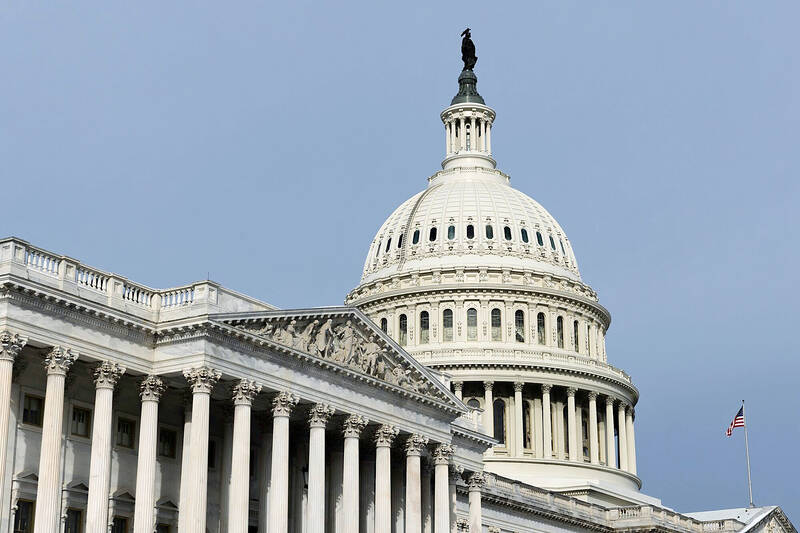A US bill that would provide tax incentives for Taiwanese businesses and workers in the US on Friday overwhelmingly passed the committee stage in the US Congress.
The US House of Representatives Committee on Ways and Means voted 40-3 to send the Tax Relief for American Families and Workers Act of 2024 to the US House for a full floor vote on the bill.
The bill’s proposals include a plan to “strengthen America’s competitive position with China by removing the current double taxation that exists for businesses and workers with a footprint in both the United States and Taiwan,” the committee said in a statement after the vote.

Photo: Bloomberg
Providing double taxation relief for such businesses and individuals would support innovation and competitiveness, as well as promote economic growth, the committee said.
Committee Chairman US Representative Jason Smith said in the statement that the act is expected to help US job creators stay competitive, allow main street businesses to survive and grow, and provide tax relief to working families struggling under the weight of rising prices and interest rates.
“The Tax Relief for American Families and Workers Act will help America compete and win against countries like China, encourage small businesses to grow and invest in American jobs and opportunity, and save taxpayer dollars by ending a COVID-era policy that has become the poster child for fraud,” Smith said.
“This tax relief package builds on the success of the 2017 Tax Cuts and Jobs Act, which produced a proven track record of delivering for families, reducing poverty and unemployment, and attracting more economic investment in communities across America” he added.
In Taipei, the Ministry of Finance has long sought a double taxation relief agreement with Washington to protect their mutual interests, as Taiwan-US economic exchanges and business activities accelerate.
In a meeting in Taipei with two former US officials on Monday, President Tsai Ing-wen (蔡英文) expressed hope that the two sides would soon address double taxation.
Taiwan-US relations continue to serve as a driving force for regional and global prosperity and development, Tsai told former US national security adviser Stephen Hadley and former US deputy secretary of state James Steinberg, who met with the president two days after the Democratic Progressive Party won the presidential election.
In Washington on Friday, White House press secretary Karine Jean-Pierre said that progress on the Tax Relief for American Families and Workers Act was encouraging and welcome.
The bill was expected to pass the US House and Senate, before being signed into law by US President Joe Biden, Pierre said.

NATIONAL SECURITY THREAT: An official said that Guan Guan’s comments had gone beyond the threshold of free speech, as she advocated for the destruction of the ROC China-born media influencer Guan Guan’s (關關) residency permit has been revoked for repeatedly posting pro-China content that threatens national security, the National Immigration Agency said yesterday. Guan Guan has said many controversial things in her videos posted to Douyin (抖音), including “the red flag will soon be painted all over Taiwan” and “Taiwan is an inseparable part of China,” while expressing hope for expedited “reunification.” The agency received multiple reports alleging that Guan Guan had advocated for armed reunification last year. After investigating, the agency last month issued a notice requiring her to appear and account for her actions. Guan Guan appeared as required,

A Vietnamese migrant worker yesterday won NT$12 million (US$379,627) on a Lunar New Year scratch card in Kaohsiung as part of Taiwan Lottery Co’s (台灣彩券) “NT$12 Million Grand Fortune” (1200萬大吉利) game. The man was the first top-prize winner of the new game launched on Jan. 6 to mark the Lunar New Year. Three Vietnamese migrant workers visited a Taiwan Lottery shop on Xinyue Street in Kaohsiung’s Gangshan District (崗山), a store representative said. The player bought multiple tickets and, after winning nothing, held the final lottery ticket in one hand and rubbed the store’s statue of the Maitreya Buddha’s belly with the other,

‘NATO-PLUS’: ‘Our strategic partners in the Indo-Pacific are facing increasing aggression by the Chinese Communist Party,’ US Representative Rob Wittman said The US House of Representatives on Monday released its version of the Consolidated Appropriations Act, which includes US$1.15 billion to support security cooperation with Taiwan. The omnibus act, covering US$1.2 trillion of spending, allocates US$1 billion for the Taiwan Security Cooperation Initiative, as well as US$150 million for the replacement of defense articles and reimbursement of defense services provided to Taiwan. The fund allocations were based on the US National Defense Authorization Act for fiscal 2026 that was passed by the US Congress last month and authorized up to US$1 billion to the US Defense Security Cooperation Agency in support of the

CLASSIFIED BRIEFING: The ministry said the special budget focuses on building a comprehensive defense system and strengthening the domestic defense industry The Ministry of National Defense yesterday released information on seven categories of weapons systems to be procured under a stalled NT$1.25 trillion (US$39.57 billion) special defense budget, including precision artillery, long-range missiles, air defense anti-tank missiles and more than 200,000 uncrewed aerial vehicles (UAVs). The Executive Yuan approved a draft version of the budget on Nov. 27 last year and submitted it to the legislature for review. The legislature’s Foreign Affairs and National Defense Committee yesterday invited Minister of National Defense Wellington Koo (顧立雄) to deliver a classified briefing and answer questions at a closed-door session. Koo said he hoped to provide lawmakers